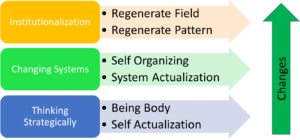Economía Regenerativa
-
Módulo 01: Introducción1.1 Lección 1: ¿Interesado en la regeneración?
-
1.2 Lección 2: ¿Qué es la economía regenerativa?
-
1.3 Lección 3: Principios de la Economía Regenerativa9 Temas
-
1.3.1 Principio 1: Mantener una fuerte circulación entre escalas de flujos clave, como energía, información, recursos y dinero.
-
1.3.2 Principio 2: Reinversión regenerativa y sostenida
-
1.3.3 Principios 3 y 4: Mantener entradas confiables y salidas saludables
-
1.3.4 Principio 5: Mantener un buen equilibrio entre los diferentes tipos de organizaciones.
-
1.3.5 Principio 6: Mantener una combinación equilibrada de resiliencia y eficacia.
-
1.3.6 Principio 7: Mantener suficiente diversidad
-
1.3.7 Principio 8: Fomentar relaciones y principios cooperativos compartidos por todos
-
1.3.8 Principio 9: Fomentar la acción positiva y restringir el comportamiento especulativo y demasiado extrovertido
-
Principio 10: Fomentar el aprendizaje grupal eficiente y flexible
-
1.3.1 Principio 1: Mantener una fuerte circulación entre escalas de flujos clave, como energía, información, recursos y dinero.
-
1.4 Lección 4: Hacia la Economía Regenerativa1 Cuestionario
-
Módulo-02: Ir más allá de los círculos2.1 Lección 1: De la Economía Lineal a la Circular
-
2.2 Lección 2: El sistema anidado
-
2.3 Lección 3: De centrarse en el producto a centrarse en el proceso1 Cuestionario
-
Módulo-03: Cambio de mentalidad de economía regenerativa3.1 Lección 1: Cambiar la mentalidad para transformar el sistema1 Tema
-
3.2 Lesson-2: Shift Mindset: “Doing” to “Being”2 Temas
-
3.3 Lesson-3: Shift Mindset: “Ego” to “Soul”1 Tema|1 Cuestionario
-
Módulo 04: Marco de Economía Regenerativa4.1 Lección 1: Niveles de Paradigma6 Temas
-
4.2 Lección 2: Comprender los niveles del paradigma como sistema
-
4.3 Lección 3: Desarrollo de una práctica de economía regenerativa5 Temas
-
4.4 Lección 4: Crecimiento cuantitativo a crecimiento cualitativo2 Temas|1 Cuestionario
-
Módulo 05: Enfoque colaborativo de la economía regenerativa5.1 Lección-1: Ecología y Economía Regenerativa 1
-
5.2 Lección-2: Economía del Desarrollo Humano9 Temas
-
5.3 Lección 3: Enfoque regenerativo para el desarrollo económico integral7 Temas
-
5.3.1 Riesgos asociados al crecimiento económico tradicional
-
5.3.2 Una estrategia evolutiva regenerativa para crear riqueza comunitaria
-
5.3.3 Desarrollo de inteligencia comunitaria de origen local: una estrategia de tres fases
-
5.3.4 Fase Uno: Pensar Estratégicamente
-
5.3.5 Fase dos: Cambio de sistemas
-
5.3.6 Fase Tres: Institucionalización de Patrones y Campos de Planificación Estratégica
-
5.3.7 Los Cambios
-
5.3.1 Riesgos asociados al crecimiento económico tradicional
-
5.4 Lección 4: Cultura Regenerativa3 Temas|1 Cuestionario
-
Módulo 06: Inversión Regenerativa6.1 Lección 1: El papel de las empresas2 Temas
-
6.2 Lección 2: Invertir desde una mente regenerativa1 Tema
-
6.3 Lección 3: Inversión en el sistema alimentario en una economía regenerativa4 Temas|1 Cuestionario
-
Conclusión
Participantes 5727
5.3.3 Desarrollo de inteligencia comunitaria de origen local: una estrategia de tres fases
septiembre 7, 2025
The regenerative development strategy is based on living systems thinking and employs systemic frameworks and ideas that community members can learn and put into practice. We employ a meta-framework to involve a community in a multi-year regenerative process. Our framework shows an ongoing learning method that allows a society to co-evolve including its environment. This systems change is supported by three overlapping phases of work: strategic thinking, driving systems change, and institutionalizing procedures and patterns. A community will experience a number of state changes during these three phases, allowing it to gradually increase its capacity for regeneration. The framework demonstrates the transition from self-actualizing to system-actualizing, in which people and groups shift their attention from maximizing their own wealth-generating potential to maximizing the wealth-generating power of systems that are greater than themselves.
This framework describes the effort that is required for a community to become capable of regenerating itself and its economy as an unique, self-reinforcing process. The simultaneous growth of inner and exterior capacities is necessary for each phase. Helping others see and develop their own potential—potential that can be articulated as a contribution towards something bigger than themselves—relates to inner work. It also has to do with enhancing their capacity for self-management so that their activities become more systemically efficient, strategic, and meaningful.
Helping individuals recognize the essence and innate potential of the biological systems they inhabit is part of outer work. In other words, it’s about teaching people a method to see their world as a dynamic, living system so they can make decisions that are actually advantageous for everyone who will be impacted.
By balancing one’s inner and outward labor, one may make sure that while one develops, they are also contributing to the health of the social and ecological systems around them, realizing that these systems are the foundation of both one’s current and future wealth. In fact, reaching one’s full potential as a person requires understanding how to deal with complicated systems. Because of this, the connection of self-actualization and system-actualization is emphasized in our strategy.


